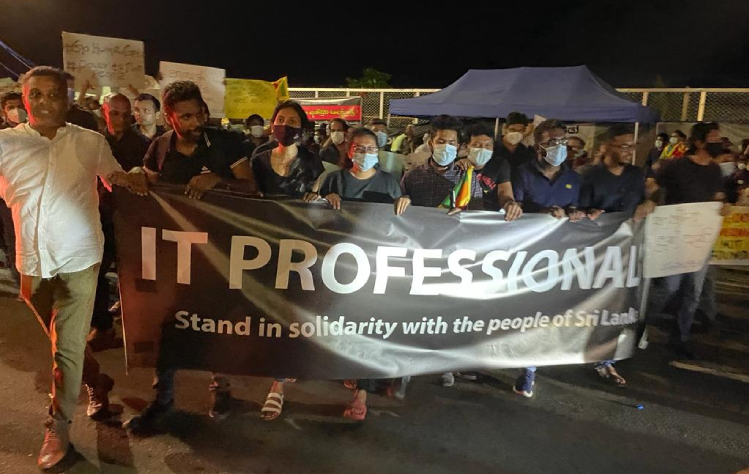
Sri Lanka faces a 'brain drain' as the country's worst economic crisis impacts drives away young professionals from its leading IT industry.
Sri Lanka's IT industry employed more than 120,000 people and was the fifth-largest export earner for the island. It was set to become the top exporter within the next five years and double its employees. However, following the default of debt repayment under the Rajapaksa regime and severe shortages of fuel, food and medicine, firms are finding It increasingly hard to operate.
Daily power cuts have made it near impossible to provide steady internet essential for the IT industry. Speaking to Al Jazeera Waidyalankara noted how clients may look elsewhere for services.
"We have spent years cultivating relationships with clients, so they are understanding, but there is always a fear that our business will be taken away and given to competitors if we cannot maintain our delivery and quality,"
The ongoing crisis and lack of a structured plan by the current government to address it has severely affected the confidence of foreign investors on the island. Some companies have decided to relocate offices and staff to countries like India and Dubai.
The ongoing economic crisis has made the cost of living exorbitant, especially as the value of the Sri Lankan rupee plummets and inflation soars. The aspirations of owning a house or a car is becoming increasingly difficult for many young professionals.
A November 2021 survey report (PDF) by the Colombo-based Institute for Health Policy, an independent research centre, found that the number of Sri Lankans who want to migrate had doubled from three to five years ago and nearly 50 percent of the young and educated wanted to migrate now. Long queues at the passport office are just one indication of this.
Since the Sri Lankan rupee began plummeting, several IT companies which earn in foreign currencies have begun pegging the salaries of their local staff to either the US dollar, the pound sterling, the euro or the Australian dollar – making the industry an attractive employer for many locals. Though this has done little to retain talent and professionals
A 35-year old software engineer who preferred not to be named moved to Australia with his family in March this year. Speaking to Aljazeera he explained why.
“I didn’t really have any plans to migrate. I ran a small IT company, and I was happy with it,” he said. But a rise in ethnic and racial tensions in the country before the 2019 elections made him think about relocating and the subsequent economic mismanagement sealed his decision. “It’s really not promising in Sri Lanka. I want to prioritize my daughter’s future,”
As the predominantly Colombo-based IT industry suffers under the current regime and economic crisis. The country has a decades-long history of economic and legislative racist policies which have crippled industries and forced people to flee from the Island. The policy of standardisation was a policy implemented by the Sri Lankan government in 1971 to curtail the number of Tamil students selected for certain faculties in the universities. Tamil students were required to get higher marks to enter university. compared to their Sinhala counterparts. This discrimination also fed into hiring practices across the industries, and civil service and government jobs became increasingly difficult for Tamils to enter.
As successive governments continue to alienate and infringe on the rights of the Tamil populace and youth and support successive anti-Tamil pogroms, many were forced to flee the island. As the conflict intensified Sri Lanka essentially implemented an embargo on the North-East, considered the traditional Tamil homelands. This stifled economic development and despite the conflict ending nearly 13-years ago, the region continues to be heavily militarised and heavily underinvested despite it being a war-torn region. Any investment is often used to further state-sponsored colonisation schemes and prop up military-owned businesses, which often undercut local Tamil businesses. Protests against the government have been ongoing for more than 1900 days, demanding justice and accountability for war crimes committed by the state. As Colombo industries warn of a 'brain-drain' due to the current economic crisis, successive generations of Tamils have been met with state violence. May 18th is marked as Tamil Genocide remembrance day by Tamils across the homeland and the diaspora. During the final stages of the conflict, at least 146,679 people are unaccounted for and presumed to have been killed by Sri Lankan state forces.
Read more at Al-Jazeera
We need your support
Sri Lanka is one of the most dangerous places in the world to be a journalist. Tamil journalists are particularly at threat, with at least 41 media workers known to have been killed by the Sri Lankan state or its paramilitaries during and after the armed conflict.
Despite the risks, our team on the ground remain committed to providing detailed and accurate reporting of developments in the Tamil homeland, across the island and around the world, as well as providing expert analysis and insight from the Tamil point of view
We need your support in keeping our journalism going. Support our work today.
For more ways to donate visit https://donate.tamilguardian.com.

